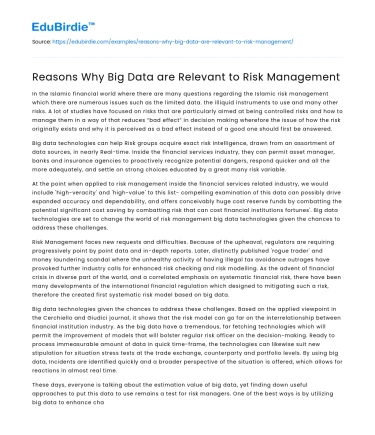Introduction
In the contemporary business landscape, characterized by rapid technological advancements and escalating data generation, the concept of big data has emerged as a cornerstone for strategic decision-making, particularly in risk management. Big data refers to the vast volumes of structured and unstructured data that inundate businesses daily. The relevance of big data in risk management stems from its potential to provide comprehensive insights into potential threats, thereby enabling organizations to mitigate risks more effectively. This essay delves into the multifaceted reasons why big data is crucial to risk management, highlighting its ability to enhance predictive analytics, improve decision-making processes, and ensure regulatory compliance. Furthermore, by addressing potential counterarguments, this discourse underscores the indispensable role of big data in navigating the complexities of risk management in the digital age.
Enhancing Predictive Analytics in Risk Management
Big data significantly bolsters predictive analytics, a critical component of risk management. Predictive analytics involves using statistical techniques and machine learning algorithms to analyze historical data and predict future outcomes. By leveraging big data, organizations can identify patterns and trends that may indicate potential risks. For instance, financial institutions utilize big data analytics to detect fraudulent activities by analyzing transaction patterns. According to a study by McKinsey & Company, organizations that incorporate big data analytics into their risk management strategies can reduce risk-related costs by up to 25%. This is particularly relevant in sectors such as finance and insurance, where predictive accuracy is paramount. Moreover, big data allows for real-time risk assessment, enabling organizations to respond swiftly to emerging threats. However, some critics argue that the reliance on big data could lead to over-reliance on quantitative models, potentially overlooking qualitative factors that are crucial in risk assessment. Despite this, the consensus remains that the advantages of big data in predictive analytics far outweigh the limitations, providing organizations with a robust tool for proactive risk management.
Save your time!
We can take care of your essay
- Proper editing and formatting
- Free revision, title page, and bibliography
- Flexible prices and money-back guarantee
Transitioning from predictive analytics, it is essential to consider how big data enhances decision-making processes within risk management frameworks. The integration of big data into decision-making not only augments the accuracy of risk assessments but also enables organizations to make informed strategic choices. This aspect of big data's relevance to risk management will be explored in the subsequent section.
Improving Decision-Making Processes
Incorporating big data into decision-making processes is pivotal for effective risk management. With the ability to analyze vast datasets, organizations can derive actionable insights that inform strategic decisions. For example, companies in the supply chain industry use big data to anticipate disruptions and optimize logistics. By analyzing data from multiple sources, such as weather forecasts and geopolitical events, organizations can make informed decisions that mitigate potential risks. A report by IBM highlights that businesses leveraging big data for decision-making experience a 20% increase in operational efficiency. Moreover, big data facilitates scenario analysis, allowing organizations to evaluate various risk scenarios and their potential impacts. This holistic approach to decision-making ensures that organizations are better equipped to handle uncertainties. However, the implementation of big data in decision-making is not without challenges. Data privacy concerns and the complexity of data integration can pose significant obstacles. Nonetheless, with robust data governance frameworks and advanced analytical tools, these challenges can be effectively managed, reinforcing the value of big data in risk management.
As we explore the regulatory landscape, it becomes evident that big data also plays a crucial role in ensuring compliance and managing regulatory risks. The ability to process and analyze large datasets enables organizations to adhere to regulatory requirements more effectively, which is the focus of the next section.
Ensuring Regulatory Compliance
Regulatory compliance is a critical aspect of risk management, and big data plays a crucial role in this domain. With the increasing complexity of regulatory environments, organizations face significant challenges in ensuring compliance. Big data analytics provides a solution by enabling organizations to monitor and analyze compliance-related data in real time. For instance, in the healthcare sector, big data is used to ensure compliance with patient data protection regulations by analyzing access logs and detecting unauthorized data access. A study published in the Journal of Risk and Compliance Management indicates that organizations utilizing big data analytics for compliance management report a 30% reduction in compliance-related risks. Moreover, big data allows for the automation of compliance processes, reducing the burden on compliance teams and minimizing the risk of human error. Despite these benefits, there are concerns regarding the ethical implications of extensive data collection and surveillance. To address these concerns, organizations must implement stringent data privacy measures and ensure transparency in data collection practices. Ultimately, the integration of big data into compliance management not only enhances regulatory adherence but also strengthens overall risk management frameworks.
Conclusion
In conclusion, the integration of big data into risk management frameworks is indispensable for organizations aiming to navigate the complexities of the modern business environment. By enhancing predictive analytics, improving decision-making processes, and ensuring regulatory compliance, big data provides organizations with the tools necessary to proactively manage risks. While there are challenges and ethical considerations associated with the use of big data, the benefits it offers in terms of accuracy, efficiency, and compliance far outweigh these concerns. As businesses continue to generate and rely on vast amounts of data, the relevance of big data in risk management will only continue to grow. Thus, organizations must embrace big data analytics as a fundamental component of their risk management strategies to remain competitive and resilient in an increasingly volatile world.






 Stuck on your essay?
Stuck on your essay?

